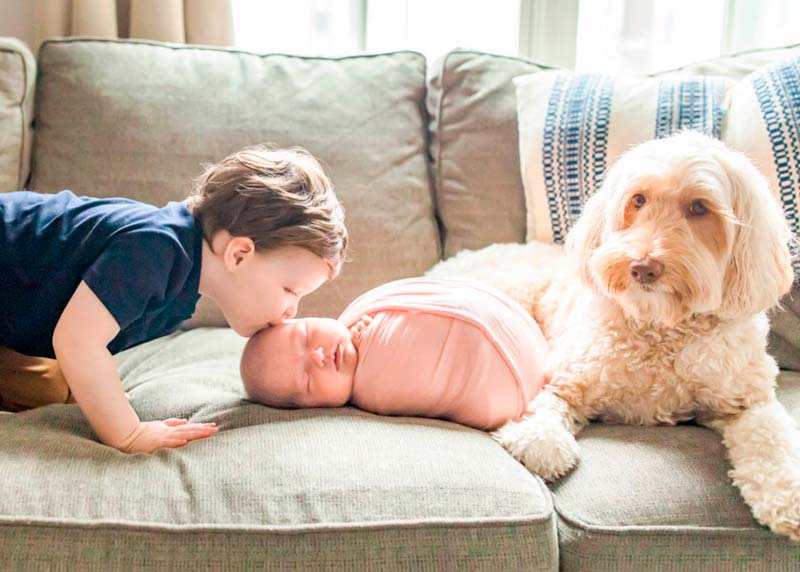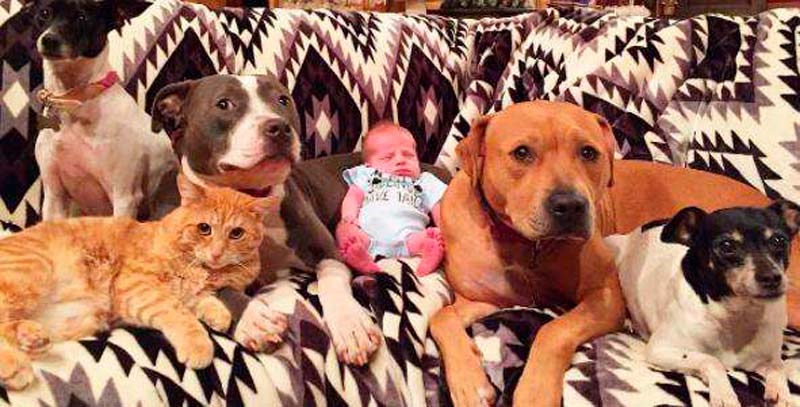
Bringing a new baby home is a momentous occasion filled with excitement, joy, and a bit of uncertainty. For parents, especially first-timers, the prospect of introducing the newborn to the family pets and older siblings can be a source of concern. How will the dog react? Will the cat be jealous? How can you ensure that your older children feel included and not overshadowed by the arrival of their new sibling? This comprehensive guide will walk you through the steps to create a harmonious environment where your new baby, pets, and siblings can thrive together.
Preparing Pets for the New Arrival
Familiarize Pets with Baby Smells and Sounds
Before bringing your baby home, it’s a good idea to familiarize your pets with the scents and sounds associated with a baby. Play recordings of a baby crying at a low volume, gradually increasing the sound to help them get used to it. You can also bring home a blanket or piece of clothing that smells like the baby from the hospital and let your pets sniff it. This will make the actual introduction less overwhelming.
Establish Boundaries in Advance
If there are areas of the house where the baby will spend a lot of time (like the nursery), start setting boundaries for your pets before the baby arrives. This could mean restricting certain areas or teaching your dog not to jump on the furniture where the baby might be. Consistency is key, so make sure to enforce these rules every time.
Address Behavioral Issues
If your pet has any behavioral issues such as jumping, excessive barking, or aggression, it’s important to address these before the baby arrives. You might want to consider professional training to ensure your pet can be calm and well-behaved around the baby. Remember, a pet’s bad behavior can be exacerbated by the stress of a new family member, so the earlier you address these issues, the better.
Maintain Your Pet’s Routine
Pets thrive on routine, so try to keep their feeding, walking, and playtime schedules as consistent as possible. The arrival of a baby can disrupt these routines, but keeping them as stable as possible will help reduce your pet’s anxiety and make the transition smoother for everyone.
The First Introduction: Pets and Baby
Keep it Calm and Controlled
When you bring your baby home, make sure your pet is calm before the introduction. It’s best to have someone else hold the baby while you greet your pet to help them feel reassured. Then, in a calm and controlled manner, let your pet approach the baby. Praise your pet for good behavior, but if they become too excited, gently redirect them to a different activity.
Supervise All Interactions
Even if your pet seems to be handling the new addition well, it’s important to supervise all interactions between your pet and the baby. Never leave your baby alone with your pet, even for a moment. Remember, pets can be unpredictable, and your baby is too small and delicate to defend themselves if something were to go wrong.
Reward Positive Behavior
Whenever your pet interacts with the baby calmly or follows commands around the baby, reward them with treats, praise, or affection. This positive reinforcement helps your pet associate the baby with good things and can foster a peaceful coexistence.
Sibling Introductions: Helping Older Children Adjust
Involve Siblings from the Start
Before the baby arrives, involve your older children in the preparation process. Let them help choose items for the nursery, pick out baby clothes, or pack the hospital bag. This involvement helps them feel included and excited about the new baby’s arrival rather than anxious about the changes it might bring.
Set Expectations Early
Talk to your children about what to expect when the baby comes home. Explain that the baby will need a lot of attention because they can’t do anything on their own yet. However, also emphasize that this doesn’t mean you’ll have less time or love for them. Clear communication can help manage expectations and reduce feelings of jealousy.
Plan One-on-One Time
It’s easy for older siblings to feel neglected once the new baby arrives, especially since newborns require so much attention. Make it a priority to spend one-on-one time with each of your older children. This could be as simple as reading a book together, taking a short walk, or engaging in a favorite activity. This special time reassures them that they are still important and loved.
Encourage Involvement with the Baby
Let your older children help with simple tasks like fetching diapers, picking out the baby’s clothes, or gently rocking the baby’s crib. This involvement helps them bond with their new sibling and feel like an important part of the family dynamic.
Validate Their Feelings
Your older children might experience a range of emotions when the new baby comes home, from excitement to jealousy to confusion. It’s important to validate these feelings and let them know it’s okay to feel this way. Encourage them to express their emotions and offer comfort and reassurance.
Navigating the First Few Weeks

Establish a Routine
Just as pets benefit from routine, so do children. Establishing a new family routine that includes time for the baby, pets, and older children can help everyone feel more secure and settled. Consistency in daily activities can reduce stress and make the transition smoother.
Create Special Sibling Time
With a new baby in the house, older children might feel left out. Creating a “Sibling Special Time” each day can help them feel valued. This time can be spent doing something the older child enjoys, like playing a game, doing a craft, or simply talking. Knowing that they have dedicated time with you can help ease any feelings of jealousy.
Balance Attention Between Baby and Siblings
It’s natural for a newborn to demand a lot of your attention, but try to balance this with spending quality time with your older children. This might mean involving them in the baby’s care or finding moments to connect throughout the day. Small gestures, like a hug, a smile, or words of affirmation, can go a long way in making your older children feel loved and appreciated.
Address Sibling Rivalry
Sibling rivalry can surface when a new baby arrives, especially if older children feel their place in the family is threatened. If this happens, try to remain calm and avoid comparing your children. Instead, focus on the unique strengths and qualities of each child and encourage positive interactions between siblings.
Encourage Bonding Between Siblings
Help your older children bond with the new baby by encouraging them to talk to, sing to, or read to their sibling. These simple interactions can help build a strong connection from the start. Additionally, praise your older children for being gentle and caring towards the baby, reinforcing positive behavior.
Creating a Safe Environment for Everyone
Baby-Proofing the Home
With pets and older siblings in the house, baby-proofing becomes even more important. Ensure that all potentially dangerous items are out of reach, and use safety gates or locks where necessary. This not only protects the baby but also keeps pets and older children safe from accidentally causing harm.
Teach Pets and Children to Be Gentle
Teach both your pets and older children to be gentle with the baby. This includes using soft voices, gentle touches, and respecting the baby’s space. Reinforce this behavior with positive feedback and model gentle interactions yourself.
Monitor Health and Hygiene
A newborn’s immune system is still developing, so it’s essential to maintain a clean environment. Make sure pets are up-to-date on vaccinations and flea treatments, and teach your older children the importance of washing their hands before touching the baby. Additionally, monitor any signs of allergies or sensitivities the baby might have towards pets.
Create Safe Spaces for Everyone
Ensure that each member of the family, including pets, has a safe space where they can retreat if they feel overwhelmed. This might be a cozy corner for your dog, a quiet room for your cat, or a special area for your older child. These spaces provide a sense of security and comfort during times of adjustment.
Overcoming Common Challenges
Managing Jealousy and Attention-Seeking Behavior
It’s normal for both pets and older children to exhibit jealousy or attention-seeking behavior when a new baby arrives. For pets, this might mean acting out or being more clingy. For older children, it could manifest as tantrums or regression to earlier behaviors. The key is to remain patient and consistent with your responses, offering extra love and reassurance during this transitional time.
Handling Sleep Disruptions
Newborns have erratic sleep patterns, which can disrupt the household, including pets and older children. Try to minimize disturbances by keeping noise levels low during nighttime feedings and naps. If your pets or older children are affected by the baby’s crying, consider using white noise machines or soft music to create a more peaceful sleeping environment.
Addressing Safety Concerns
If you have any concerns about your pet’s behavior around the baby, it’s crucial to address them immediately. This might mean seeking advice from a veterinarian or animal behaviorist. Similarly, if your older child exhibits aggressive or unsafe behavior around the baby, have a calm discussion about appropriate ways to interact and consider involving a child psychologist if needed.
Managing Your Own Stress
Bringing home a new baby is a significant life change, and it’s normal for parents to feel overwhelmed. It’s important to manage your stress so you can be present and attentive to the needs of your baby, pets, and older children. Don’t hesitate to ask for help from family, friends, or professionals. Remember, taking care of yourself is crucial to taking care of your family.
Celebrating the New Family Dynamic
Embrace the Chaos
Life with a newborn, pets, and older children can be chaotic at times, and that’s okay. Embrace the chaos and find joy in the little moments of your new family dynamic. The adjustments may take time, but each day brings opportunities for growth, connection, and love.
Cherish Special Moments
Documenting milestones and special moments with your baby, pets, and older children can help you appreciate the journey and celebrate your growing family. Whether through photos, videos, or keepsakes, capturing these memories can be a wonderful way to reflect on your family’s unique story.
Foster a Loving Environment
Above all, creating a loving and supportive environment for your baby, pets, and older children is key to a successful transition. Celebrate the love and bond that each family member brings, and nurture these relationships as you all adjust to the new addition.
Conclusion
Bringing a new baby home is a journey filled with excitement and challenges. By preparing your pets and older children for the arrival of the baby, maintaining routines, and fostering a loving environment, you can create a harmonious and joyful atmosphere for everyone. Remember, patience, communication, and love are the cornerstones of a smooth transition. Cherish each moment as your family grows and evolves together.


